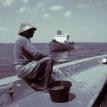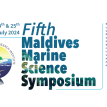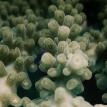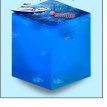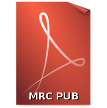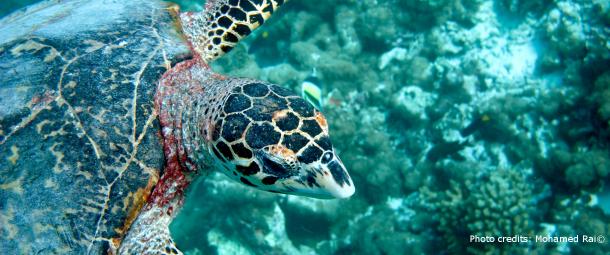
Review of the Status of Marine Turtles in the Maldives - 2016
A recent review on the status of marine turtle populations in the Maldives is now published and available for download via this link. This review is based on data gathered from a citizen-science program developed in 2015, by Marine Research Centre with assistance from Project REGENERATE implemented by IUCN/Marine. The citizen science program - ‘Turtlewatch Maldives’, aims to establish abundances of foraging and nesting turtles through in-water and nesting surveys using standardized protocols. The pilot phase, started in January 2015, was initially carried out by marine biologists based at tourist resorts. The nesting survey component of the program was later extended to survey significant nesting islands with assistance from locals. Turtle nesting surveys at selected egg-harvesting-banned islands started in June/July 2015 by employing locals in data collection.
The in-water component of the study showed hawksbill turtles to be the most frequently sighted followed by green turtles. The highest turtle sighting per in-water survey was recorded for Baa atoll, with most frequent sightings being of hawksbill turtles. The study found that in-water sightings of the green turtle were low for most of the surveyed atolls with the exception of Lhaviyani atoll. The results of the nesting surveys conducted at selected islands and resorts showed highest nesting occurrence at L. Gaadhoo. However, annual nesting estimate for L. Gaadhoo from this study showed a 40% decline when compared with the annual nesting estimate for the year 1984.
Until the recent protection of turtles under Environment Protection and Preservation Act (4/93), marine turtles of the Maldives were protected through two consecutive ten-year moratoria on direct harvest throughout the Maldives. Restrictions on egg harvesting at selected islands was introduced later, in the second ten-year moratorium. Although moratoria on direct harvest of turtles were successful in preventing the exportation and local trade of turtle shells, poaching of turtles for local consumption are still prevalent in some parts of the Maldives.
Based on the findings of the study, the review provides policy recommendations ranging from declaring a total ban on harvest of turtles for an indefinite period of time to imposing a nation-wide ban on harvesting of turtle eggs. The review also highlights the importance of continuing monitoring efforts at turtle nesting islands to identify the “best turtle islands”, in order to facilitate the inclusion of two most significant turtle habitats in the Maldives into the IOSEA-MoU1’s Site Network. The review also recommends increasing public awareness on turtle conservation issues as awareness among public in this respect was very low despite turtles having being protected for the past two decades in the Maldives.
Marine Research Centre would like to extend our appreciation to all the people, organizations and resorts who were involved in this study. The benefits of the citizen science program would not have been yielded without the support and commitment from the resort-based marine biologists and local surveyors. We are grateful for the collective effort seen throughout this project to achieve the mutual goal we all share in safeguarding our marine resources.
1 Indian Ocean South-East Asian Marine Turtles Memorandum of Understanding

